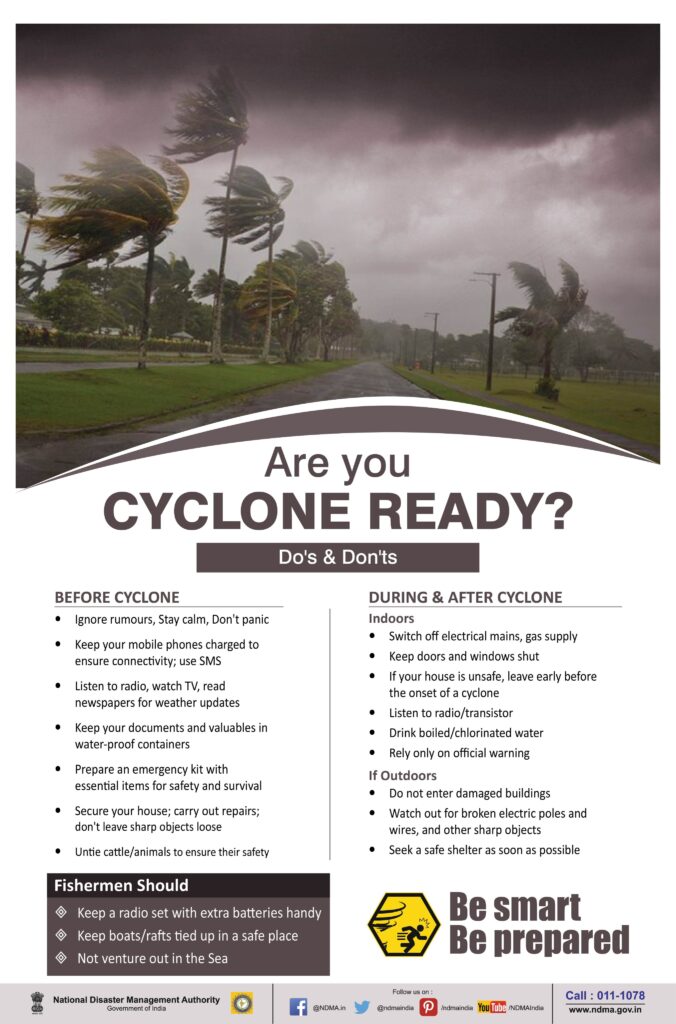Swasthya Plus News Desk
Less than 10 days after Cyclone Tauktae wreaked havoc on the western and southern coasts of India, a second extreme weather event is looming close.
Cyclone Yaas, currently gathering steam over the Bay of Bengal, is scheduled to make landfall on May 26. Coastal districts of Odisha are already experiencing rainfall. How can you stay safe during, and in the immediate aftermath of, a “very severe cyclonic storm” like Yaas?
Official Warnings:
Cyclone Yaas is predicted to cause moderate rainfall in a number of coastal districts in West Bengal and Odisha from the 25th to 27th of May, with heavy to very heavy rainfall in isolated areas. However, light to moderate rainfall is expected across the affected regions in the days leading up to the landfall on May 26. In addition to rains, there is also a warning for high wind speeds and rough sea conditions. Fishing communities are advised to avoid venturing into the sea during the days their region is worst affected, and those already out in deep seas are directed to return to the safety of the coast.

Precautions before landfall:
- Only follow official & credible information sources, and stay calm at all times
- Electricity might be affected by the rain and high-speed winds. Keeping your mobile phones charged, along with charged power banks is extremely important for connectivity
- Due to risk of flooding, store valuables and important documents like ID proof, transcripts, etc. in waterproof containers or bags
- Ensure the safety of pets and farm animals
- Ensure your windows and doors lock well. If not, conduct repairs in advance
- Prepare an emergency kit – with non-perishable food, essential medication and first aid supplies, sanitary napkins/other menstrual products, toilet paper, bottled water, torch and batteries, sanitisers, masks, blanket, one fresh set of clothes per family member – in case of evacuation or flooding in the house. Keep emergency medications for snake bites and diarrhoea ready
- Ensure there are no loose items of décor, outdoor plants, furniture, or tools outdoors that might be swept away and turned into debris. Fishing communities must ensure their boats are secure
Staying safe during the cyclone:
- Unplug all electronic appliances
- Keep away from floodwater. It could be contaminated with toxins and pathogens
- Keep doors and windows firmly locked, stay indoors
- Stay dry
- Eat freshly cooked or dry food, and ensure availability of boiled drinking water
- In case you are evacuated, make sure you carry your emergency kit. Dress practically and wear sturdy shoes
After the cyclone:
- Take proper precautions and avoid venturing out unless it is an emergency
- Keep away from electric poles and fallen power lines to avoid electrocution
- Keep children away from flood waters
- Check for damaged electrical appliances and avoid using them
- Use mosquito nets to avoid malaria
- Avoid using toilet and tap water in case water lines or sewage pipes are damaged
Impact on health:
Extreme weather events tend to exacerbate pre-existing health conditions, and also put us at risk of infections and injuries. Make sure you keep taking your regular medication, stay dry, and in case you have a history of respiratory ailments or other conditions that might be adversely affected by the cyclonic conditions, stay in touch with a doctor.
Also, as we battle a pandemic, keep sanitisers on hand, and follow COVID safety protocols at every step of the way. Ensure that there is enough water and nutritious food stored for COVID patients isolating at home.

